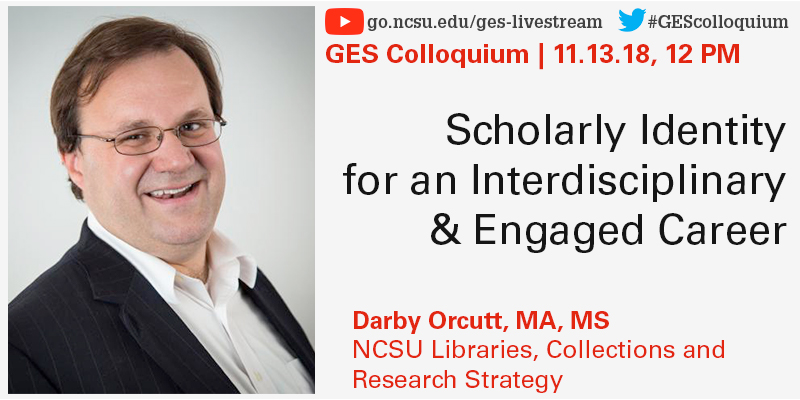
- This event has passed.
Darby Orcutt – Scholarly Identity for an Interdisciplinary and Engaged Career

GES Colloquium | YouTube: LIVE STREAM
Scholarly Identity for an Interdisciplinary & Engaged Career
Speaker:
Darby Orcutt, Assistant Head, Collections & Research Strategy, NCSU Libraries (link, Twitter @Darby_Librarian)
Abstract:
Managing one’s scholarly identity has never been perfectly straightforward and easy to do, but it can be especially challenging for researchers and scholars who cross disciplinary boundaries and whose research outputs may include work outside the traditional peer-reviewed article. Indeed, we are preaching to the choir when speaking to those active in the Genetic Engineering & Society Center about the vital importance of engaging with diverse academic, professional, and public audiences and producing research outputs that can have tremendous impact on policy and public perception.
Controlling one’s own presentation of scholarly identity is especially important in this context, rather than simply relying on traditional academic indexes and measures. As interdisciplinarity and public engagement become more and more central from the perspectives of funders and research institutions, we also should all have an informed stake in how these activities are counted and represented. In this colloquium session, we hope to raise significant questions and provoke intentional conversation around these issues, conversations that may be especially important for Ph.D. students and faculty mentors to have across the Center’s disciplines.
We will also share one of the NCSU Libraries’ initiatives to encourage use of ORCID for maintaining the list of your works. We will talk about the benefits of using ORCID, how it relates to alternatives like Google Scholar or ResearchGate, how it fits into researcher workflows, and introduce the services the Libraries provides to help you get started or update your ORCID profile.
Bio:
Darby Orcutt is Assistant Head, Collections & Research Strategy, NCSU Libraries; Faculty, University Honors Program; Affiliated Faculty, Center for Innovative Management Studies; and Affiliated Faculty, Genetic Engineering & Society Center. A professional enabler of interdisciplinary team research, his library work, teaching, and research cluster around themes of facilitating cultural understanding and academic collaboration across diverse disciplines, industries, and publics.
WordPress database error: [Unknown column 'wp_tec_occurrences.start_date' in 'SELECT']SELECT SQL_CALC_FOUND_ROWS wp_posts.*, CAST( wp_tec_occurrences.start_date AS DATETIME ) AS event_date
FROM wp_posts LEFT JOIN wp_term_relationships ON (wp_posts.ID = wp_term_relationships.object_id) LEFT JOIN wp_postmeta ON ( wp_posts.ID = wp_postmeta.post_id AND wp_postmeta.meta_key = '_EventHideFromUpcoming' ) LEFT JOIN wp_postmeta AS mt1 ON ( wp_posts.ID = mt1.post_id )
WHERE 1=1 AND wp_posts.ID NOT IN (11448) AND (
wp_term_relationships.term_taxonomy_id IN (149,249,542,543,544,555)
OR
wp_term_relationships.term_taxonomy_id IN (45)
) AND (
wp_postmeta.post_id IS NULL
AND
( mt1.meta_key = '_EventStartDate' AND CAST(mt1.meta_value AS DATETIME) >= '2026-02-21 23:36:52' )
) AND wp_posts.post_type IN ('post', 'page', 'attachment', 'tribe_venue', 'tribe_events', 'tribe_event_series') AND ((wp_posts.post_status = 'publish'))
GROUP BY wp_tec_occurrences.occurrence_id
ORDER BY event_date ASC, wp_posts.post_date ASC
LIMIT 0, 3